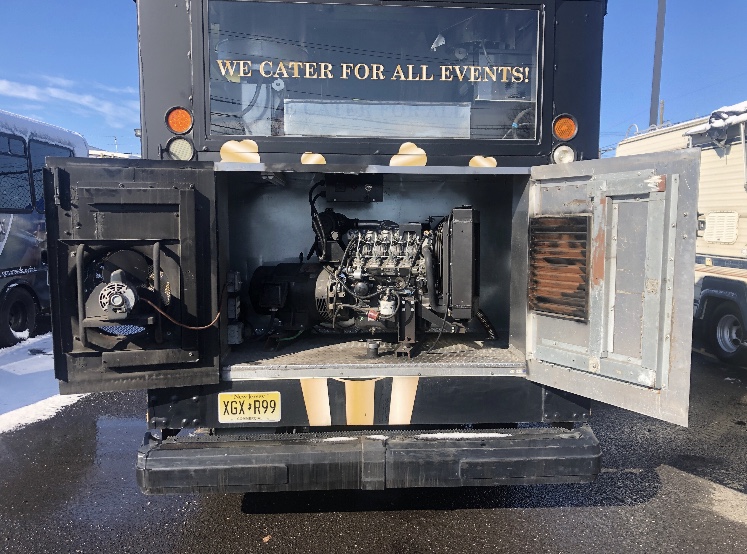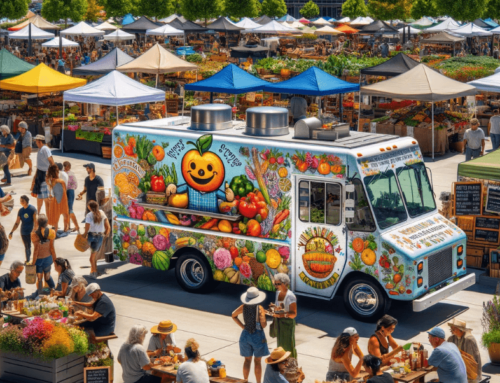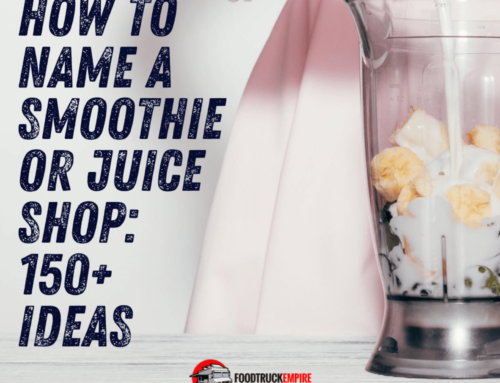One of the frequently asked questions in our annual Food Truck Academy program is what permits or licenses are required to operate a food truck. Unfortunately our answer is always an unfulfilling, “It depends on where you plan to operate.”
As you may have already discovered during your food truck business research, the licenses and permits required to start a food truck are different in every city and county in the United States. This makes it difficult to provide a straight answer to a seemingly simple question.
On the positive side, the organizations you need to contact in order to start a food truck are consistent across the country. If you know the right entities to contact in your area then it’s a matter of making a few calls and sending some emails to figure out exactly what you need to do from a legal perspective to get rolling.
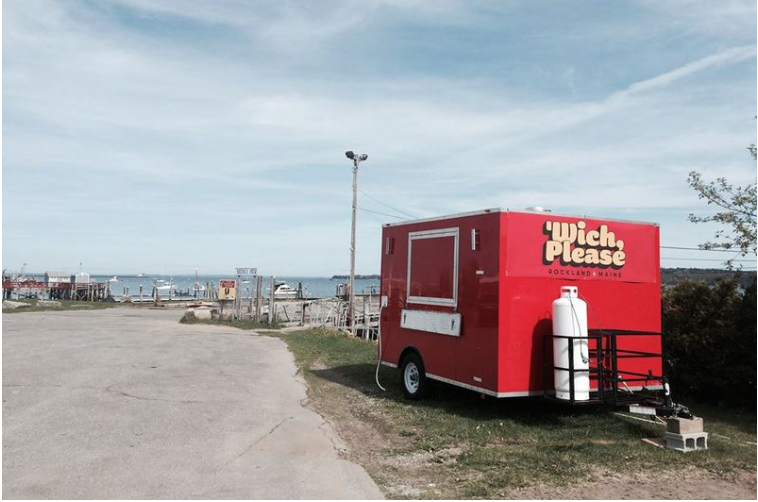
What food trailer permits will you need?
At a collective level, figuring out what you need to do to operate a food truck has become easier over the past five years. If you plan to operate in a larger city like a Boston or San Diego then all the legal information you need to start a food truck is probably already published online. If you plan to operate live in a larger city, check our quick reference guide below where we’ve included direct links to startup guides where they are available.
If you plan to operate in a smaller town or rural area, you’ll need to jump through more hoops and make a few more phone calls to determine the local requirements. Let’s get started.
Food Truck Permit and License Checklist
Not all every license listed below will be a requirement in your area. But you will want to check with your local government bodies to confirm what does apply. Gather the information for each requirement using the checklist below and you can be confident knowing you’ve completed your due diligence.
Business License: You will need a business license to start a food truck anywhere. While any business entity can technically be used to start a food truck most operators will choose either an LLC, Sole Proprietorship or a Cottage Food Business designation.
If you start a cottage food business there are limits to the sales volume you can generate in one calendar year. Many food vendors start out as a cottage food business because it has the lowest cost and barrier to entry and then apply for an LLC when their sales volume requires it. There’s no perfect business entity for everyone so do your research and figure out the best approach for you.
Social Security Number or Employer Identification Number (EIN): If you plan to employ anyone on your food truck, you will need an Employer Identification Number (EIN) or valid Social Security Number from the IRS. Depending on how you structure an LLC, you may receive an EIN as part of the business formation process. Click here to apply for an EIN online through the IRS.
Driver’s License: Since you will be driving the food truck or trailer, you will need a valid state driver’s license where you operate the business. In most cases, you will not need a commercial driver’s license to drive a food truck.
Food Handlers Permit: Depending on the state, this is called a food handler’s card or certificate. Where required this permit is required by all employees or owners handling food preparation or storage. The goal is for all employees working with food to understand the basics of food safety. If you live in California, Texas, or Florida you can take this test online. This is not an exhaustive course and will take a 2 – 4 hours to complete on average. There is typically a fee of under $50 to take this test.
Health Department Permit: This is the big one. This permit certifies that you are have all the equipment and processes in place to serve safe food from a mobile unit. In most areas, you will need this permit clearly displayed outside your window when serving the public.
To determine the requirements and application process for the health department in your area, head to Google and search “health department + city name” without quotes. You should get the local health department website at the top of the results page. From there you can contact the department by email or phone to request the information you need to start a food truck in your city. Jump to the city specific health department permit section below to see if your city publishes food truck requirements on their website.
Commissary Letter of Agreement: Some cities and counties will require that starting each service day at a commercial kitchen. Where required this commissary letter must be signed by your commissary or commercial kitchen. This agreement proves that you have access to a facility used as a supply for fresh water, trash and waste water disposal, food preparation and storage. You can view an example of a Commissary Letter of Agreement here.
Standard Operating Procedures Document: Most cities will not require this, but it’s becoming more popular. This document requires you to provide the process used to make each menu item on your food truck. This can be a time consuming document if you plan to make a large menu. You will also list your cleaning and sanitization methods here. Here is an example of this type of document for San Diego County.
This document is time consuming to create, but it’s actually a great way to document the processes on your food truck. You can use this same information to train new employees and ensure they are following the right processes. We suggest including this information inside your business plan so the information is completed when you decide to start the application process. This will speed up the entire process.
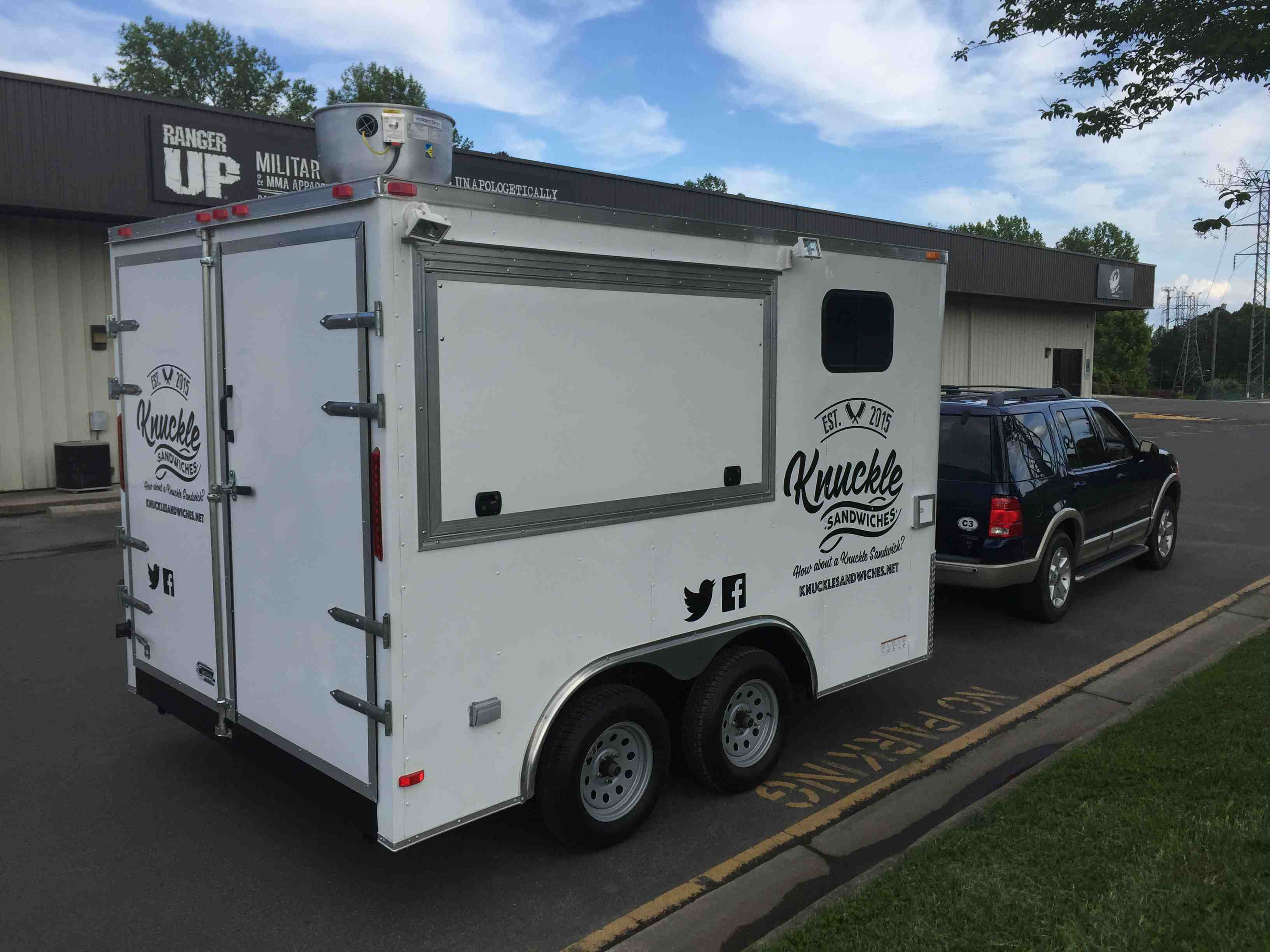
Knuckle Sandwiches food trailer in action.
Fire Certificates: Some counties and cities require that a food unit is inspected by the fire department and provided with a certificate verify it’s safe to operate. Fire departments will confirm there is a fire suppression system onboard the truck, a fire extinguisher in case of emergency, and may also inspect your electrical wiring to ensure there are no frayed cords or other hazards.
Parking Permits: This requirement only applies in large cities. Some cities require a parking permit for the opportunity to park and vend on certain streets and during certain times. Most cities don’t have this requirement, but it’s worth asking about if you plan to operate in a downtown area.
Special Event Permit: These are also known as vending permits. Sporting events, concerts, festivals, and even farmer’s markets will often require a special event permit. This is a temporary permit that allows you to serve food for the duration of an event (usually one day to a week). When a special event permit is required the event coordinator or promoter will typically provide you with information on acquiring this.
Certificate of Insurance: You will need to acquire insurance and carry your certificate of insurance onboard the unit when you vend. There are two coverage components required on a food truck:
- Commercial auto coverage: This is the coverage (kind of like car insurance) that protects your food truck from theft, vandalism, or during an accident.
- General liability insurance: In most areas, you will be required to have $1 million in general liability coverage that protects the business from injuries to customers and property damage. If you plan to vend at events like fairs or parades, you will often be required to provide a copy of this insurance when you submit an application to vend at a special event.
City and County Permit Requirements
As mentioned earlier, many larger cities publish food truck licenses information. This can be really helpful if you plan to vend in one of these cities. Here are the links to cities and counties where we were able to find this information. If you know about any other cities that publish local food truck laws in the future, please let us know by email or social media and we’ll update the list.
- Austin, TX Mobile Food Vendors
- Boise Mobile Food Establishment Packet
- Boston Food Truck Permits
- Denver Food Truck Guide
- Green Bay, WI Mobile Food Vendors
- Houston, TX Mobile Food Units
- Kansas City Food Permits for Mobile Units
- Los Angeles Mobile Food Vending
- Madison, WI Food Cart and Vending Guide
- Miami Dade County Mobile Food Sales
- Milwaukee Mobile Food Establishments
- Minneapolis Mobile Food Vendor
- New York City Mobile Food Vending
- Portland, OR Mobile Food Units
- St. Louis Food Truck Permits
- San Antonio Mobile Food Vending
- Seattle Street Food Vending Requirements
- How to Obtain a Mobile Food Permit for the City of San Diego
- San Diego County Mobile Food Program
- Santa Cruz Mobile Vending Permits
When you get done submitting your applications and paying all your fees, make sure to keep the documents organized in a safe place you can access quickly. We recommend investing in a filing cabinet to organize all of your business permits and applications in one spot. We also recommend taking photos of each document using an iPhone so you can access the information in case a document is damaged or lost.
Completing each of the legal requirements needed to start a mobile food business can be frustrating and will certainly be time consuming. If there’s a certain step of the permitting process holding you up don’t forget there are people out there to ask.
Ask employees at your local health department. These people are in their roles to help clarify and answer questions about code. It can also help to become friends with a local food truck vendor. Folks already operating a food truck understand what it takes to get these applications completed successfully and can be a good resource too. Consider hiring them for consulting for a few hours and it will make the research process much easier. Don’t feel like you need to figure everything out on your own.
Find out how much it will cost to start a food truck in our complete guide. Click here to download our free Food Truck Business Startup Kit.

